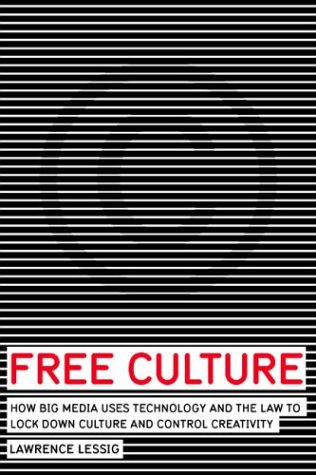Originally
published on Monday, May 10, 2004 in The Miami Herald
Author analyzes subversion of copyright law.
Many
big media companies have extended their copyright 'protection' almost
indefinitely for their own benefit -- not the creator's or the public's.
BY RICHARD PACHTER
rpachter@wordsonwords.com
Free
Culture: How Big Media Uses Technology and the Law to Lock Down
Culture and Control Creativity. Lawrence Lessig. Penguin Press.
348 pages. (also available as a free
download in a variety of formats at
www.free-culture.com)
After a recent review
of a book on the history of music recording and playback technology,
e-mail from a London correspondent excoriated me for not respecting
the rights of creators. I responded that throughout the history
of popular culture, the status quo resisted many technological changes
that were ultimately -- and profitably -- adopted.
In the course of my research, I also discovered that industries
and companies now among the most outspoken opponents of liberalized
access and distribution of intellectual property were established
under very interesting circumstances.
HOLLYWOOD'S `PIRATES'
I'd encountered an article
in Wired magazine
by Lawrence Lessig, a professor at Stanford Law School, in which
he excerpted from his new book. He wrote: 'The Hollywood film industry
was built by fleeing pirates. Creators and directors migrated from
the East Coast to California in the early 20th century in part to
escape controls that film patents granted the inventor Thomas Edison.
These controls were exercised through the Motion Pictures Patents
Company, a monopoly `trust' based on Edison's creative property
and formed to vigorously protect his patent rights.
'California was remote enough from Edison's reach that filmmakers
like Fox and Paramount could move there and, without fear of the
law, pirate his inventions. Hollywood grew quickly, and enforcement
of federal law eventually spread West. But because patents granted
their holders a truly `limited' monopoly of just 17 years (at that
time), the patents had expired by the time enough federal marshals
appeared. A new industry had been founded, in part from the piracy
of Edison's creative property.''
`RIP, MIX AND BURN'
In his book, Lessig also points out that Walt Disney's first big
success, the animated short, Steamboat Willie, was an early example
of ''rip, mix and burn'' -- the technique used by today's downloaders,
mixers and other digital ''outlaws.'' That Mickey Mouse cartoon
was a parody derived from Buster Keaton's 1928 hit film, Steamboat
Bill, Jr.
Indeed, as Lessig also points out, many so-called ''Disney'' properties
are based on works by the Brothers Grimm and others: Jungle Book,
Pinocchio, Fantasia, Dumbo, Cinderella, Robin Hood and more. These
stories did not write themselves or appear from thin air. Some were
in the public domain or out-of-copyright. But that was in the day
when copyrights had finite terms. Lessig writes that many big media
companies -- Disney among them -- have subverted a fundamental aspect
of copyright laws by extending their ''protection'' almost indefinitely
for their own benefit -- not the creator's or the public's.
.
Lessig writes about the music business (naturally), as well as architecture,
copy machines, software, drugs and other aspects of what's been
placed under the umbrella of ``intellectual property.''
It's an interesting and provocative book, and one that ought to
be read by artists and others who make their living creating, buying
and selling pieces of culture. The history and context of the commercial
exploitation of creative work might help readers understand its
future, too.
Lessig's approach toward copyright is further evidenced in the fact
that this book is available as a free
download. He's also encouraged the creation of some very creative
derivative works. Go to http://www.free-culture.com
for more information.
Like business books? Join the club.
|

